#Maladies rares
Text
RDKT : premier dispositif médical connecté pour accélérer la prise en charge des maladies rares
Pour combattre l’errance diagnostique des patients atteints de maladies rares, une nouvelle application web et mobile pour les professionnels de santé est désormais disponible : RDK (Rare Disease Knowledge). Découverte.
Issue d’un partenariat public-privé unique qui s’appuie sur l’expertise d’Orphanet-Inserm, la technologie de Tekkare®, l’engagement sociétal de As We Know® et le soutien de…

View On WordPress
#application mobile santé#As We Know#digital santé#e-santé#esanté#Maladies rares#Orphanet#patient#Rare Disease Knowledge#RDK#sante 2.0#Tekkare
3 notes
·
View notes
Text
Sword of Malady
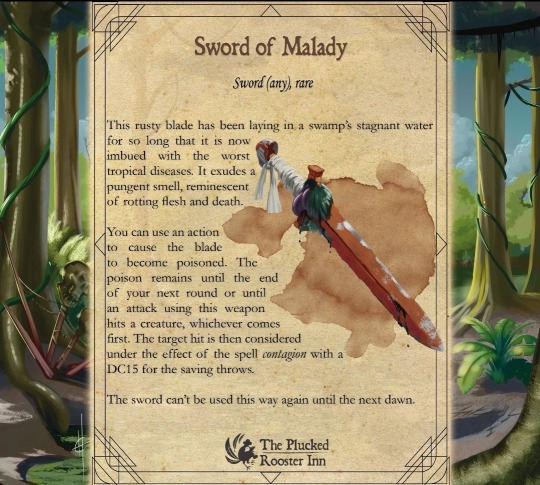
4 notes
·
View notes
Text
500.000 patients sont atteints d’une maladie rare en Belgique : « Il faut en moyenne presque 5 ans pour poser un diagnostic »
https://www.sudinfo.be/id799875/article/2024-02-29/500000-patients-sont-atteints-dune-maladie-rare-en-belgique-il-faut-en-moyenne
Source: sudinfo.be
1 note
·
View note
Text

l’association marocaine des maladies auto-immunes et systémiques (AMMAIS) vous souhaite une tres bonne année 2024
Que chaque pas que vous ferez en 2024 vous rapproche un peu plus de vos objectifs les plus chers.
*
Les maladies auto-immunes résultent d’un dysfonctionnement du système immunitaire, censé nous protéger des agressions extérieures, qui va le conduire à s’attaquer à notre propre organisme. Elles constituent un important problème de santé publique du fait de leur poids économique et humain : 3ème cause de morbidité dans le monde après les maladies cardiovasculaires et les cancers, elles touchent en effet près de 10 % de la population mondiale et occupent le deuxième ou le troisième poste du budget de la santé dans beaucoup de pays. Enfin, dernier point méconnu mais pas le moindre, ces maladies concernent les femmes dans plus de 75 % des cas : une femme sur six en est atteinte au cours de sa vie !
Passons donc en revue ce que sont ces pathologies et les actions de l’association AMMAIS
Un processus d’autodestruction de l’organisme
Notre système immunitaire est composé notammentde cellules spécialisées comme les lymphocytes et de substances (les anticorps) chargées normalement de nous défendre contre toute attaque extérieure provenant de différents virus, bactéries, champignons et autres produits délétères.
Lors d’une maladie auto-immune (MAI) ou à manifestations auto-immunes, des éléments de ce système se trompent d’ennemi et s’en prennent à nos tissus et cellules. Certains anticorps devenus nos adversaires s’appellent alors « auto-anticorps ». Au total, il existe près d’une centaine de ces troubles.
La nature des atteintes varie énormément selon l’affection. Le système immunitaire peut attaquer par exemple une seule substance spécifique comme la couche protectrice (myéline) des cellules nerveuses dans le cerveau, la moelle épinière et le nerf optique dans la sclérose en plaques ou plusieurs éléments comme les cellules et les tissus de la peau, des articulations, du cœur et des reins dans le lupus.
Il existe deux catégories de pathologies auto-immunes :
- celles qui sont limitées à un seul organe et appelées maladies auto-immunes « spécifiques d’organe » (comme la maladie de Basedow qui touche la thyroïde ou le diabète de type I qui touche le pancréas) ;
- celles au cours desquelles plusieurs organes sont touchés successivement ou simultanément, dites alors maladies auto-immunes « systémiques ». comme : le lupus (atteintes préférentielles des articulations, de la peau, des reins, du système cardiovasculaire, des globules rouges mais aussi pratiquement de n’importe quel organe) ; la polyarthrite rhumatoïde (atteinte principalement articulaire, plus rarement pulmonaire et cutanée), le syndrome de Gougerot-Sjögren (atteintes des glandes salivaires et lacrymales, occasionnant un syndrome sec, et plus rarement des articulations, de la peau et des poumons) ; la spondylarthrite ankylosante (atteintes articulaires surtout de la colonne vertébrale mais aussi parfois pulmonaires et neurologiques).
Parmi ces pathologies, on peut citer beaucoup d’autres maladies connues, même si la plupart des gens ignorent leur origine auto-immune commune, comme la myasthénie, la maladie cœliaque (intolérance au gluten), la majorité des affections thyroïdiennes, les maladies inflammatoires chroniques de l'intestin ou « MICI » (maladie de Crohn, rectocolite…) ou encore le psoriasis, le vitiligo (atteinte de la peau qui s’accompagne de dépigmentation) et l’alopécie (une attaque des follicules pileux à partir desquels poussent les cheveux)
Et beaucoup de maladies rares peu connues du grand public comme le syndrome de Goodpasture, le pemphigus, l'anémie hémolytique auto-immune, le purpura thrombocytopénique auto-immun, la polymyosite et dermatomyosite, la sclérodermie, l'anémie de Biermer, la glomérulonéphrite…
Les femmes principales cibles des maladies auto-immunes
Ces affections n’épargnent pas l’homme ni malheureusement l’enfant mais c’est la femme qui porte très majoritairement ce fardeau dans plus de 75 % des cas. La proportion de femmes atteintes pour un seul homme est ainsi dans la maladie de Basedow (Hyperthyroïdie) de 7 femmes pour 1 homme, le lupus de 9f/1h, le Gougerot de 9f/1h, la polyarthrite de 2,5 f/1h, la sclérose en plaques de 2f/1h…
Plusieurs explications sont données à ce phénomène, impliquant le rôle :
Des hormones sexuelles féminines, les œstrogènes : elles stimuleraient trop, dans certains cas, le système immunitaire, alors que les hormones masculines, les androgènes, ont plutôt un effet protecteur ;
Du chromosome sexuel féminin X : Les femmes possèdent dans leurs cellules deux chromosomes X, (l’un hérité du père et l’autre de la mère). Normalement, un seul reste actif tandis que l’autre est qualifié de « dormant ». Si ces deux restent fonctionnels, une hyperactivation anormale du système immunitaire en découle ;
La grossesse : un échange de cellules se produit entre la mère et le fœtus et donc un passage de cellules fœtales à la mère (le microchimérisme fœtal). Elles se retrouvent dans le sang de la mère jusqu’à 30 ans après l’accouchement et jusqu’à 50 ans dans la moelle osseuse ! Elles peuvent être considérées comme des éléments étrangers par le système immunitaire qui va alors s’attaquer par erreur à certains organes. La femme est en plus beaucoup plus surexposée que l’homme qui n’est confronté qu’à un seul type d’échange de cellules entre lui et sa mère alors qu’elle en reçoit de sa propre mère et de ses enfants.
Signalons qu’il existe cependant quelques maladies auto-immunes que les hommes sont tout aussi ou plus susceptibles de développer que les femmes comme la spondylarthrite ankylosante, le diabète de type 1, le granulomatose de Wegener et le psoriasis.
De ce fait, la femme est à la fois au cœur des maladies auto-immunes et des maladies rares (beaucoup étant peu fréquentes ou rares) ! Alors que ce phénomène « féminin » est connu de la communauté médicale, il reste largement ignoré du grand public marocain, faute d’être suffisamment médiatisé. A l’exemple d’autres pays comme les Etats-Unis où des campagnes sont menées de la part de la puissante American Autoimmune Related Diseases Association - AARDA), il mériterait pourtant de faire l’objet de larges campagnes de sensibilisation, autour du concept global d’auto-immunité, en direction des femmes, comme c’est le cas pour le cancer. La journée de la femme ou la journée internationale de la santé serait tout indiquée pour ces actions !
Des thérapeutiques de plus en plus efficaces
Le traitement des maladies auto-immunes repose sur la cortisone, les immunosupresseurs et depuis quelques années sur les thérapies biologiques
Ces affections ne sont pas curables définitivement mais sont maîtrisables maintenant. Les traitements sont destinés à ralentir ou à supprimer la réponse immunitaire pathologique. Ils s’appuient sur : les corticoïdes par voie orale ou en bolus (injection intraveineuse d’une dose importante), les immunosuppresseurs : (cyclophosphamide, azathioprine, méthotrexate, Mycophénolate Mofétil…), les échanges plasmatiques ainsi que les immunoglobulines et enfin les biothérapies.
Outre un médecin généraliste, la prise en charge de ces maladies est assurée par différents spécialistes en fonction des organes touchés (rhumatologue, gastroentérologue, cardiologue…) et / ou un spécialiste en médecine interne, encore appelé « interniste », une spécialité quelque peu méconnue au Maroc : il soigne notamment les patients qui présentent plusieurs organes malades, ou sont atteints simultanément de plusieurs maladies. Les maladies auto-immunes sont au cœur de ses compétences.
les buts et l’action de l’association marocaine des maladies auto-immunes et systémiques (AMMAIS)
Les objectifs d’AMMAIS, créée en 2010 à la suite d’une rencontre avec un groupe de marocaines atteintes de la maladie de Gougerot, sont d’informer et sensibiliser grand public et médias sur ces maladies en tant que catégorie globale afin que le diagnostic soit plus précoce, d’aider à leur meilleure prise en charge et de promouvoir la recherche et les études sur elles.
Elle organise régulièrement des manifestations comme les journées de l’auto-immunité, les rencontres sur le syndrome sec et la maladie de Gougerot-Sjögren… ou encore des rencontre clinico-biologiques avec l’association marocaine de Biologie Médicale (AMBM). Le président d’honneur d’AMMAIS est le Pr Loïc Guillevin, professeur de médecine interne.
L’association se donne par ailleurs pour but de contribuer à la création par les malades eux-mêmes d’associations spécifiques comme l’association marocaine des intolérants au gluten (AMIAG), l’association marocaine de la fièvre méditerranéenne familiale (AMFM), l’association marocaine des malades d’angioedèmes (AMMAO)… ou encore l’association pour les personnes atteintes de rachitisme vitamino résistant hypophosphatémique (RVRH-XLH).
Ammais est enfin à l’origine de la création en 2017 de l’Alliance des Maladies Rares au Maroc (AMRM) avec d’autres associations de patients atteints de maladies rares. N’oublions pas à ce propos que beaucoup de maladies auto-immunes sont aussi des maladies rares !
Elle s’est inspirée des modèles des pays plus développés, où des associations de malades atteints de maladies rares et des malades dépourvus d’association se sont unies depuis plusieurs années en « Alliances », telles la France avec l’Alliance Maladies Rares ou la Suisse avec Proraris.
Enfin, les deux associations (sans beaucoup de moyens mais avec beaucoup de bonne volonté) entretiennent des relations d’amitié, de solidarité et de collaboration avec de nombreuses associations de malades à travers le monde comme l’association française de Gougerot-Sjögren (AFGS), l’Association Française des intolérants au gluten (AFDIAG), l’Association Française de la Fièvre Méditerranéenne Familiale et des autres Fièvres Récurrentes Héréditaires (AFFMF), l’American Autoimmune Related Diseases Association (AARDA), l’Alliance des maladies rares française, l’organisation World’s Hereditary Angioedema (HAEi)…Elles ont noué enfin des relations informelles avec des ONG dans le monde arabe (Algérie, Tunisie, Liban, Egypte…) et en Afrique (Sénégal, Côte d’Ivoire, Congo…).
Dr MOUSSAYER KHADIJA الدكتورة خديجة موسيار
Spécialiste en médecine interne et en Gériatrie en libéral à Casablanca. Présidente de l’association marocaine des maladies auto-immunes et systémiques (AMMAIS) et de l’Alliance des Maladies Rares au Maroc (AMRM) , Vice-présidente du Groupe de l’Auto-Immunité Marocain (GEAIM)
0 notes
Text
Le Manoir des glaces
Camilla Sten nous revient avec un thriller tout aussi glaçant que «Le village perdu». Cette fois une héritière est confrontée à de lourds secrets de famille et à un tueur qui rôde autour du manoir isolé qu’elle est venue découvrir alors que l’hiver est là
En deux mots
Eleanor découvre sa grand-mère assassinée. Alors que l’enquête de police piétine, elle se rend avec son compagnon et l’exécuteur testamentaire dans le vaste domaine dont elle vient d’hériter. Alors qu’un hiver rigoureux s’installe, elle cherche à en savoir davantage sur l’histoire de ses aïeux. Mais la mise à jour de secrets de famille ne semble pas plaire à tout le monde. L’assassin…

View On WordPress
#Amour#avocat#blizzard#Enquête#Famille#forêt#froid#grand-mère#Homicide#huis clos#isolement#maladie rare#manoir#Meurtre#nuit#passé#prosopagnosie#secret#Suède#tueur#vie de couple
0 notes
Text
Erythermalgie secondaire
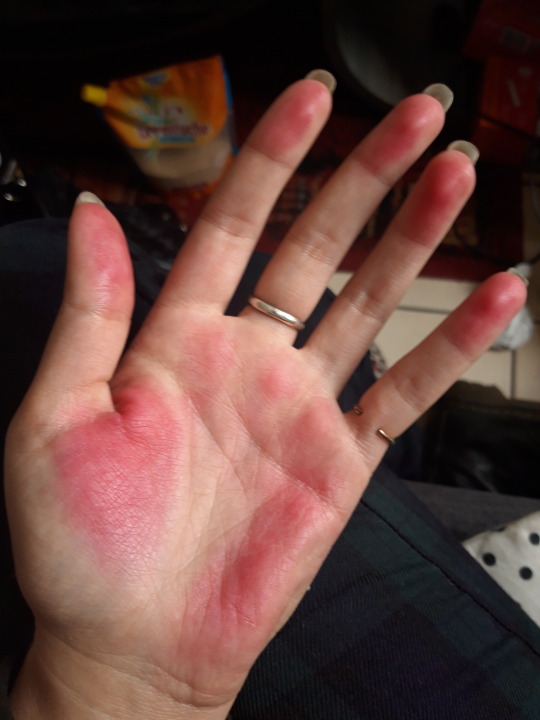
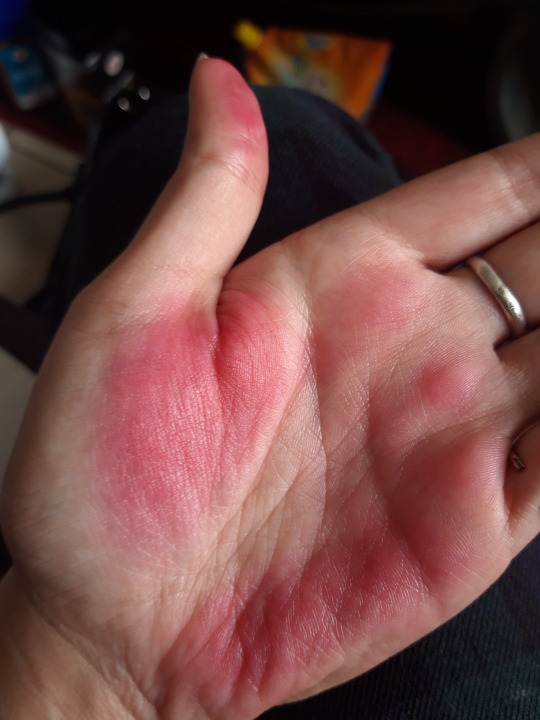
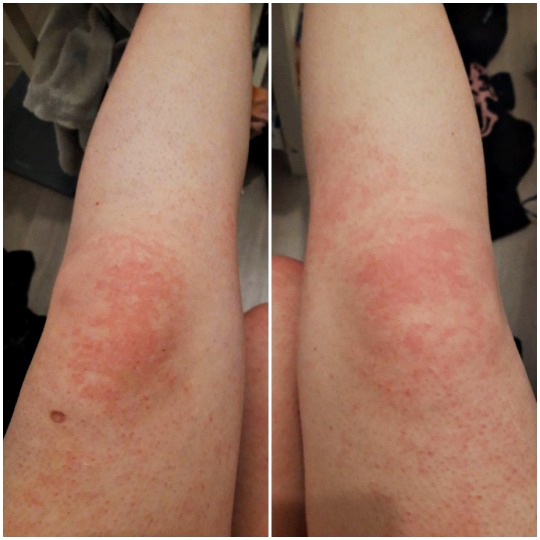
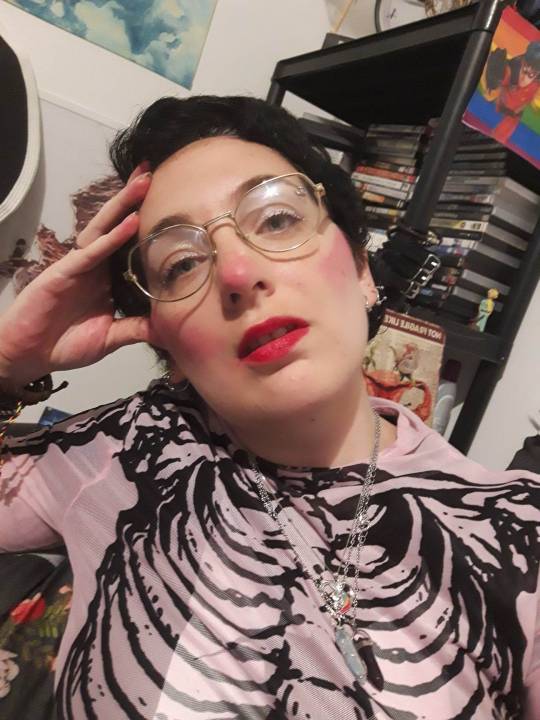
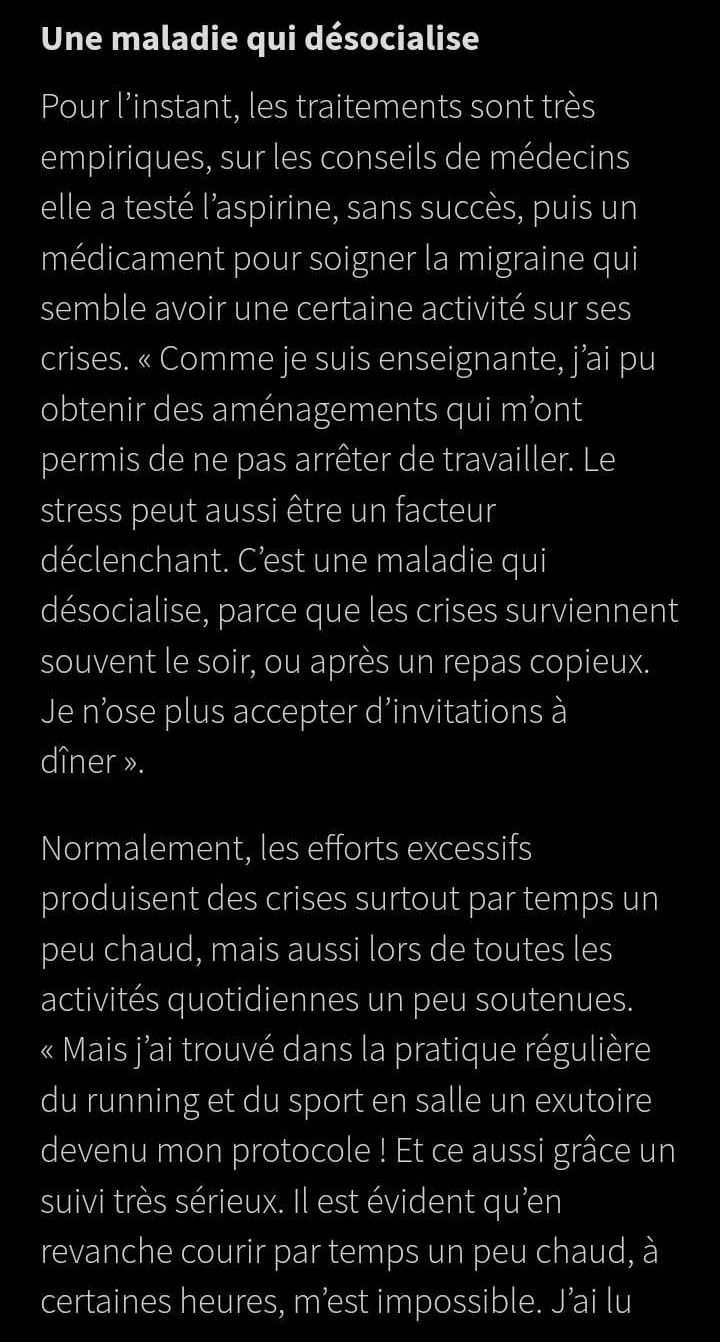
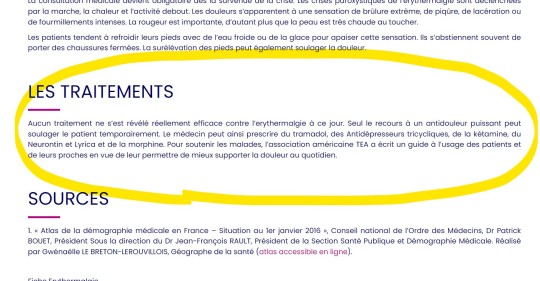
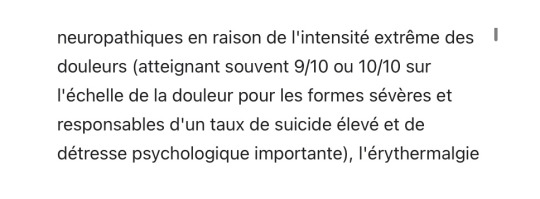

#erythermalgie#erythermalgia#erythermalgie secondaire#erythermalgie primaire#syndrome de l'homme de feu#maladie rare#maladie orphline#brûlures#brûlure#douleur#douleurs
1 note
·
View note
Text
anxiety-induced ap world study session except i immediately calmed down once i started working on review packets because i'm autistic about history
0 notes
Text
Maladies rares : le podcast un canal plébiscité
[vc_row][vc_column][vc_column_text]A l’occasion de la Journée Internationale des Maladies Rares le 28 février, voici un focus sur les podcasts mettant en lumière ces pathologies souvent méconnues. A vos casques !
Le podcast est un média de plus en plus populaire auprès des acteurs de santé. On observe l’émergence de nombreux podcasts audio santé qui traitent de différents sujets du domaine de la…

View On WordPress
0 notes
Text
Comment et pourquoi les maladies très rares font-elles mal à ces moments-là en Europe ?
Comment et pourquoi les maladies très rares font-elles mal à ces moments-là en Europe ?
Début mai 2022, Les autorités britanniques ont tiré la sonnette d’alarme : plusieurs cas de variole du singe, cette maladie bénigne et très rare en Europe, ont été détectés au Royaume-Uni. Quelques jours plus tard, plusieurs pays occidentaux, dont la France, ont fait de même et indiqué que la maladie était présente sur leur territoire.
Jusqu’à cantonné en Afrique centrale ou occidentale, le virus…
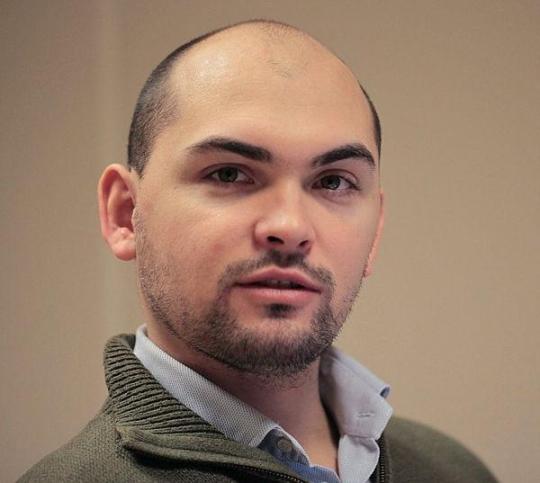
View On WordPress
0 notes
Text
about saiki kusuo...
he's a leo.
he's incredibly tidy. if his parents leave the house in a mess, he'll complain but proceed to deep-clean it anyways.
he's a stickler for other people's safety. if he notices someone's shoelace is untied, he'll tie it for them, regardless of the circumstances (ie. smack-dab in the middle of a sports game)
on another note, he seems to have a fixation with tying people's shoelaces for them.
he's weak for sweets in general, not just coffee jelly. sweet tooth saiki!
he has a huge soft spot for kids. this probably stems from his failed childhood friendship with akechi.
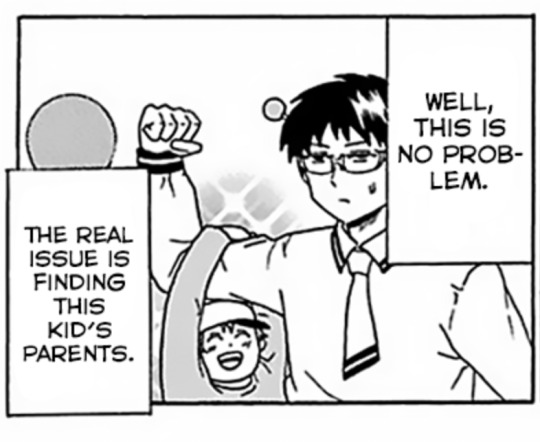
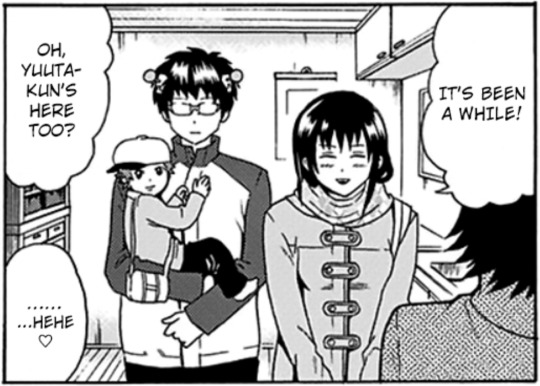
he's scared of bugs because he can't read their minds. this implies that powerless!saiki might be a lot shyer, more anxious, and even pricklier, since he doesn't know what anybody's thinking.
he's totally a mama's boy. he learned his moral compass from her, does whatever she wants, believes he was born an esper to protect her, etc.
also, the notorious zebra print blazer was because of his mom.
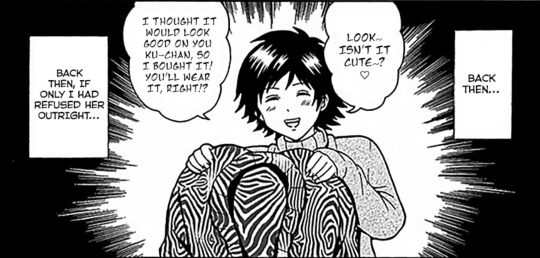
he's so much of a people-pleaser that he'll sacrifice his desire for anonymity and normalcy; he'll insert himself into situations, stalk people, and use his powers even if it means the spotlight will fall on him.
not only is he a people-pleaser, he's a drama queen. he'd rather concoct elaborate plans to avoid somebody instead of simply rejecting them.
he's a one piece fan.
his favorite arcade game used to be whack-a-mole, and he thought destroying all the moles meant he'd won. he was banned because of this.
his glasses are colored glasses from his childhood toy box. wording implies that he's been wearing this same pair his whole life.
he likes baking/cooking, mostly because he gets to eat the sweets that he made. (househusband saiki... heh.)
he smiled a lot more freely as a kid. when he wasn't wearing a dazed expression, he looked like quite the cheerful child.
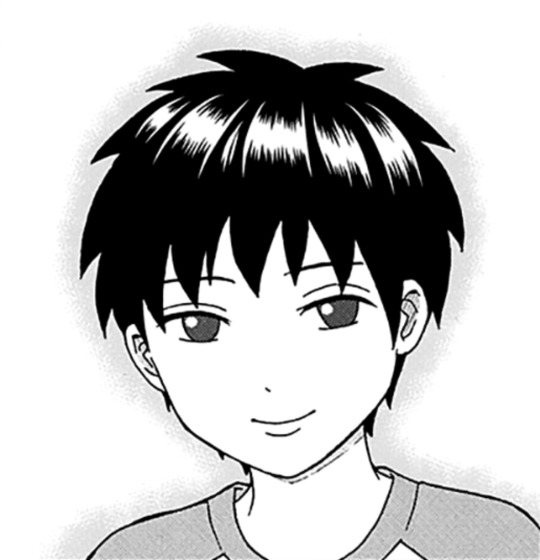
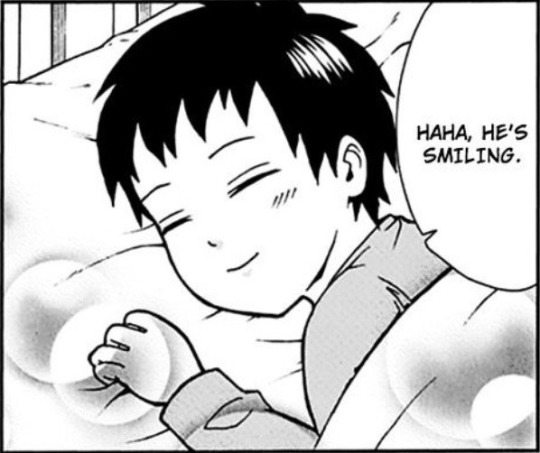
he helps kaido out with classwork by simply handing him his own work.
he rarely gets sick, and when he does he can cure himself by turning his body into an inferno through pyrokinesis. however, this means he knows next to nothing about medicine.

similarly, he's tragically naïve about the internet.
he's good at singing and likes karaoke (preferably singing by himself).
like kaido, he gets seasick. however, he fervently denies this. he seems to think himself impervious of the maladies regular people suffer from.
he has a bit of a girly run.
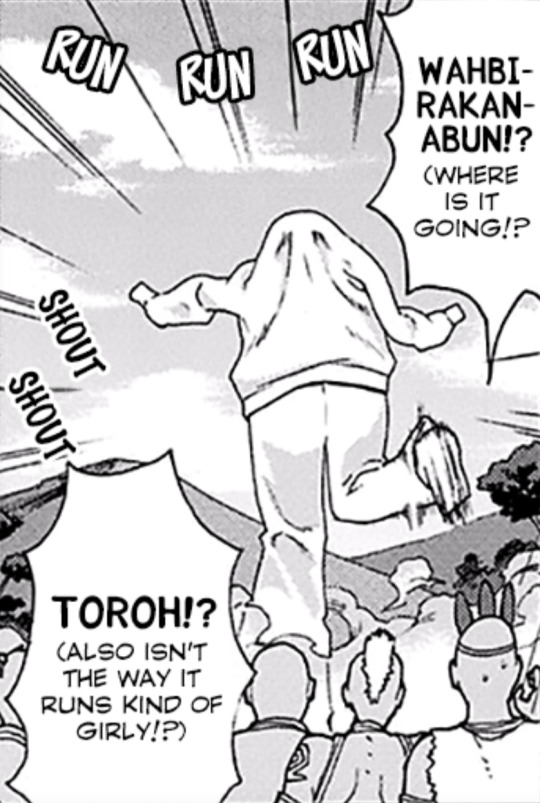
he likes using takahashi as a joke. "it's everyone's favorite, takahashi." he also hates takahashi because of his strong resemblance to akechi's childhood bully, takashi.
he likes hot baths.
when he walks home from school, he follows this routine: he stops at the convenience store, picks up coffee jelly, puts it back on the shelf, then continues home. ...incredible. he seems incapable of not staring at any nearby coffee jelly.
he may be willing to downplay his smarts/talents to avoid trouble, but he'll get competitive when he's with akechi or kusuke.
he's hesitant to cause his friends any harm, but will freely maim toritsuka, so long as the damage is immediately reversed.
he won't hesitate with kusuke, though.
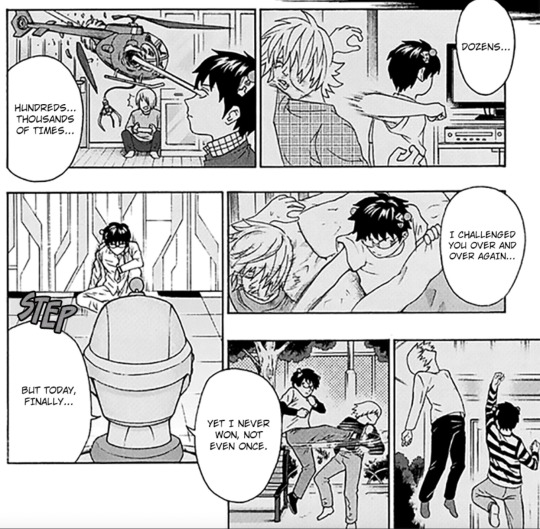
lastly, and most importantly:
he's a cutie patootie <3
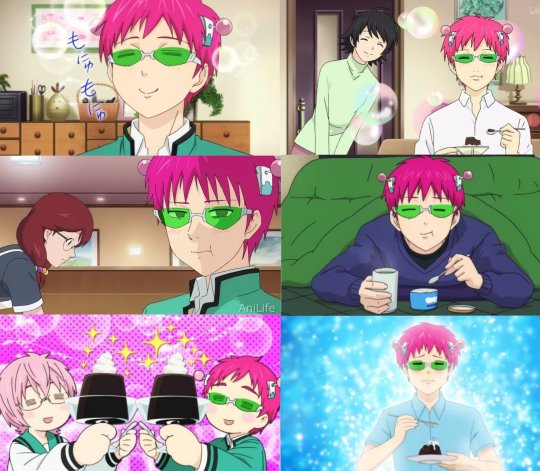
#last pic courtesy of saikbot on twitter!!!!#had to clear this outta my notes app#source: i divined it in a dream#just kidding this is all random tidbits i picked up while blazing through the manga#enjoy saiki stans#saiki k#saiki kusuo#the disastrous life of saiki k#saiki kusou no psi nan
299 notes
·
View notes
Text
Semi-related to my post on how human conservation practices, but I have a cold today, and it's got me thinking about biological altruism—the biological imperative to put other creatures ahead of yourself, to benefit the group.
When talking about possible interactions with other species, we talk a lot about humans being crazy and thrill-seeking and impossible to kill. Never use a warning shot as an incentive to keep humans out of a fight; it'll just make them angry. And that's true. But a valid criticism I've seen in the "Earth is a death world" community is that according to our understanding of evolution, every planet must be some form of death world. Competition fosters evolution—the wolf with sharper claws survives when its litter mates die. You can't reach space travel without some casualties along the way.
But the dog survives because it makes friends with the strange ape carrying a sharp stick. And the strange ape survives because it befriends the wolf. Underneath the death world is an inextricable and undeniable layer of the bond world; the love world; the world, together.
I imagine some worlds are not death worlds. They're peaceful and tranquil. I suspect there are worlds far more deadly than Earth, where the skies rain diamonds, harder than any substance we know with the species to match. And I imagine that they are united in their confusion at the duality of humankind.
Today is a great example: I have a cold, and I want someone to take care of me, but the people who would are immunocompromised, also sick, or live 8 hours away, respectfully. I also want no one within the walls of my apartment or I will eat them. I feel gross, I feel tired, and I don't want a single human being anywhere near me, even if they did bring soup.
In my constant scrolling through my phone today, I decided to look up why the hell I feel so bad—why everyone feels so bad when they're ill. And the answer surprised me. I always thought it was because your immune system is active, so it's using a lot of your energy. That is part of it. Another part is that your brain and body are communicating across the blood-brain barrier to fight the infection, which is rare and energetically expensive.
But that doesn't explain everything, and according to more current research, it could also be what's called the Eyam Hypothesis: that we feel so gross, so we instinctively isolate from other people. We're too tired to deal with others, and so we don't infect them. Misanthropy for the good of the species. Of course, it can also backfire: one of the criticisms of the Eyam Hypothesis is that humans also instinctively care for each other. If my brother has a headache, I drive to the store for Advil.
Personally, I think it's a little bit of both: biological altruism. Either way, the majority live on. The first thought I had this morning when I woke up wasn't "I feel gross" it was "there's no way I'm going to work today." And while that might not be everyone's first thought, you don't even have to be a particularly altruistic person to not want to leave your home or your bed when you're sick. It's inborn.
And so when the human named Ismail comes down with a case of the interstellar common cold, his alien friend Dyos grows very concerned. Ismail is usually intensely social, almost off-puttingly so. Some crew members joke about how his quarters are for sleeping and prayer only; if he's home alone? You should be worried. But when Dyos demands an answer to the severity of Ismail's malady, the other humans just nod knowingly.
"Nah, he's okay, the medics already cleared him. It's not a severe infection."
"But there are so many...fluids. And his body has changed color."
There is a moment of confusion there until they remember that Dyos's species can see in the infrared color spectrum.
"Nah, that's just a low-grade fever. It should break in the next couple days."
"But he doesn’t want to play chess today," Dyos insists.
"Ohhhh," says human Claudia, finally understanding. "No, that's normal. Humans don't like being around other people when they're sick, it's supposed to be one of the major evolutionary advantages. Protect your community from your illness and the genes live on."
"So we're just going to leave him alone?" Dyos is troubled by this. He can go for weeks without speaking to another life form, but he has seen Ismail grow despondent when unable to participate in social gathering.
"Oh, no," human Claudia says, laughing. "We're going to employ one of the other most longstanding human evolutionary advantages."
There are many to choose from and Dyos settles on, "middle age?"
"Sort of," human Claudia opens up a small shipping container and holds up a brown paper bag tied with a colorful ribbon. It glows brightly in Dyos's vision, almost as brightly as human Claudia's smile. "His nanni's hot soup, express delivery."
#i feel like this is the one that's going to get discourse and to that i say:#stop it i no feel good#we can talk about other human responses to disease when my skull goes back to being the right temperature#send good feelings the us postal service won't let my babushka send me soup#anyway#humans are human#humans are space orcs#humans are space australians#earth is space australia#earth is a death world#earth is a bond world#lemme know if i forgot any of the main ones
821 notes
·
View notes
Text
La petite Indya, dont les parents avaient appelé à l’aide, est décédée - La DH/Les Sports+
Source: dhnet.be
0 notes
Text
Missing (Aemond Targaryen x Reader)
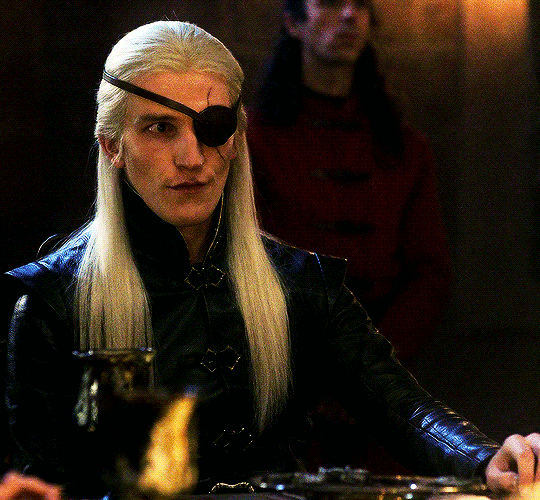
Author's note: This can be a sole piece or a multi-chapter series, depending on your wants, hence your feedback on the same is much appreciated.
Warnings: Angst. Unrequited love.
Being a daughter of the Master of Laws of Viserys The Peaceful's Small Council ensured that you were blessed with a beautiful life that almost made up for the absence of your mother. But it were the healing abilities that you inherited from birth that truly made you special.
Unlike any maester who had to rely on their poultices, teas and potions to heal wounds, you could heal with the simplest touch of your hand.
Word of your "powers" was kept a closely guarded secret, your presence being constantly needed around the royal family to tend to their wounds and maladies.
When the Rogue Prince Daemon suffered injuries during tourneys or during battles such as one at the Stepstones, you were at hand to heal him.
When the King himself fell ill after cutting his hand upon one of the swords on the Iron Throne, it was you who were summoned to tend to his health. The King eventually had confided in you that had you been born a few years earlier, perhaps you would have been able to save the life of his beloved Queen Aemma. It was a guilt you carried deep within yourself, having lost your own mother to childbirth.
Being an innately gifted healer as a child, you were granted access to the highest and best possible education in Westeros, something that was accessible only to members of the Royal blood.
You grew up along with the young princes. Sons of the Kings's eldest daughter Princess Rhaenyra: Jacaerys, Lucerys and baby Joffrey. And the King's own children with Queen Alicent Hightower: Aegon, Aemond and Helaena.
Over the course of the years, you had grown especially close to the Princes and Princess Helaena, taking your lessons with the children of the Royal Family a rare opportunity afforded to you on account of your abilities.
But it was Prince Aemond you found yourself seeking out the most, being a source of comfort for him when his brother and nephews (playfully) teased him of the account of not being bonded to a dragon.
You discussed the arts and philosophy with Aemond, watching him train in combat in the courtyard of the Red Keep along with his brother and nephews while you received your medical education from Grand Maesters from the Citadel.
Being so closely knit with the Royal Family, you watched them drift apart, with Prince Daemon taking Lady Laena Velaryon to wife and moving to Pentos, while Princess Rhaenyra moved to Dragonstone with her husband, Ser Laenor Velaryon.
Memories of the day still bring tears to your eyes, when you recall how tightly Jacaerys and Lucerys had hugged you before departing King's Landing and how you had kissed little Joffrey's tiny hand, feeling his fingers clutch at your own finger.
Even though you exchanged letters by ravens with the young princes Jacaerys and Lucerys, you could feel the divide growing between them and the children of the King and Queen Alicent.
Your closeness to Princess Rhaenyra's children did nothing to deter you from eventually falling in love with young Aemond before you even knew what love meant.
Perhaps it was during those long walks through the godswood where you spoke with him about your lessons. Or perhaps it was when he hugged you in tears, Aegon's cruel taunts for being dragonless finally getting under his skin. Or perhaps when he quietly confided in you that you were his best friend.
You couldn't describe the warmth swelling in your heart at his words when he told you how special and precious you were to him, in the naivety of your childhood.
But it would be a sombre event that led to the shattering of your heart.
--------
Attending the funeral of Lady Laena Velaryon at Driftmark was a sobering moment in the giddiness of your growing yet secret affection for Prince Aemond.
You watched as they buried Lady Laena at sea, where she could finally rest, being one with the waters of Driftmark.
Finding Jacaerys and Lucerys, you gave the princes a hug, the reunion between your friends bringing a smile to your lips. You comforted Lady Laena's daughters, Baela and Rhaena. And eventually, you met Prince Daemon.
"I wish you had been at Pentos with us, little one," Prince Daemon said with a sad smile. "Perhaps my brave girl and my child would've lived."
The words brought tears to your eyes as you remembered King Viserys' confession about Queen Aemma's death, a sudden sense of guilt wracking you. What use was your education if you couldn't save the loved ones of your loved ones?
Instead of allowing Prince Daemon to hug you in condolence, you ran away in tears, hoping to find Aemond and speak to him.
But the conversation you so desperately needed never came about. In place of it, you overheard an exchange between Aegon and Aemond that destroyed your heart.
------------
"You love her," you exhaled, feeling like you had received a blow to your chest. "You love her, do you not?"
Blood turning cold, your eyes met the young, snowy haired prince's.
"You told Aegon that if only your mother had betrothed you to Helaena, you would have done your duty," you said, hating how your voice trembled. "You love her, don't you, Aemond?"
"I don't know what has gotten into you tonight, but this can wait, I have a dragon to claim," he said, an arrogance edging into his voice, something that you had often seen in his interactions with Aegon or his nephews. You never dreamt that it would ever be directed at you.
"You need to answer me, Aemond. You owe our friendship this courtesy."
The young prince looked like he was in a rush, desperate to be anywhere else but here in this moment.
"Yes!" he exclaimed. "Yes, I do love Helaena! And what of it? Are you going to run and tell my mother? My father?"
Simply hearing his admission felt like your heart had been split into two and been set alight by dragonfire.
"No, I wouldn't dream of it. I-"
"Now if you will excuse me, I have a dragon to claim," he said, a lust for power glowing in his eyes as he pushed past you.
You fell to your knees, tears flooding into your eyes at the realisation that your love for him would forever remain unrequited. That Aemond had chosen a dragon over his best friend. That he loved Helaena and it would never be you...
Gasping and wiping furiously at your cheeks, you took off, running as swiftly as your feet could carry you, into the night, sneaking past the Targaryen household guards...
---------
The next morning, everything had changed. Aemond had lost an eye, he had claimed the biggest dragon in the seven realms, Vhagar, and he had lost his best friend, who's name he had cried out as he bled from his eye. And King Viserys' healer had gone missing.
Your heart had suddenly hardened to dragonglass, unyielding like Valyrian steel and you found yourself at Princess Rhaenyra and Prince Daemon's feet as they were watching the Royal Fleet return to King's Landing along with Vhagar, Dreamfyre and Sunfyre, begging to them to shield you to take you away from the royal family and give you a place in their household in secret.
While Princess Rhaenyra was reluctant at your request, not wanting to deny her father the best medical care possible, it was Prince Daemon who understood your desperation. He convinced Princess Rhaenyra to smuggle you to Dragonstone, the two having made their own plans to marry and set Ser Laenor free to be with his lover Qarl in the Free Cities.
The two understood that having a healer of your calibre on their side would only prove advantageous, given how tense the situation was within the Royal Family.
The "official" story would be that you had gone missing, never to be found, giving your father the closure he could find, while Prince Daemon and Princess Rhaenyra would raise you as their ward, in secret.
As you healed the Valyrian steel gash on Princess Rhaenyra's arm inflicted by Queen Alicent and Prince Lucerys' broken nose, a result of Aemond's actions, with a simple touch, they knew how valuable you'd be to them.
But even as you demonstrated your skill at healing, you felt a twinge of guilt, knowing full well that you could have healed Aemond's eye in a moment.
Yet you chose not to. Just as Aemond had made his choices, you had made yours.
And you had chosen a side in the war that would change the future of Westeros.
Part 2
#hotd#house of the dragon#aemond one eye#aemond targaryen#ewan mitchell#angst#aemond targaryen x targaryen!reader#aemond x reader#aemond x you#aemond x helaena#aemond x oc#aemond targaryen x oc#aemond targaryen x reader#aemond targaryen x helaena targaryen#aemond targaryen x y/n
2K notes
·
View notes
Text
li lianhua's final letter to di feisheng
i hear the official eng subs weren't great so here's my own attempt at a translation (under a read more bc fuck it's Long)
edit: translated qiao wanmian’s letter to li xiangyi as well, which mirrors this one!
十年前
Ten years ago,
东海一决
during the duel of the eastern sea,
李某蒙兵器之利
this unworthy Li made benefit of whetted blade
借沉船之机与君一战犹不能胜
and capsizing boat whilst battling thee but was yet unvictorious.
君武勇之处
Thy martial prowess and valiance
世所罕见
are unexampled in this world.
心悦诚服
Mine heart delights in it, and by mine own will yields to thine eminence.
今事隔多年
The affairs of today are by many years separated.
沉疴难起
By pains alone would a lingering malady be cured.
剑断人亡
The sword hath broken—the man hath perished,
再不能赴东海之约
and can no more honour the accord to duel by the eastern sea.
谓为憾事
Such is the cause for most sincere regret.
余感念君所赠之忘川
I recall in deepest gratitude the flower of oblivion bequeathed by thee,
然终有负君之所望
yet did forsake all thou hadst longed for in the end.
江山多年
The rivers and mountains of this land have many years endured,
变化万千
their changes reckoned in the tens of thousands.
去去重去去
Partings upon partings, farewells upon farewells;
来时是来时
the coming times shall be the coming times.
方多病习我之功法
Fang Duobing hath been studied in my skills,
资质上佳
and his own endowments of the utmost excellence.
不暇多日
Shouldst he not keep idle days,
定不在明月沉西海之下
he shall surely be not beneath the bright moon sinking into the western sea.
君今无意逐鹿
Thou hast not now any desire to pursue the throne,
但求巅峰
but instead to seek the height of skill.
李某已去
This unworthy Li hath since gone;
若君意不平
if thy desire be not appeased,
足堪请其代之
he shall suit, shouldst thou bid him succeed me.
李相夷绝笔
Thus end the last words of Li Xiangyi.
footnotes
i've translated this letter into (my best attempt at) early modern english to try and reflect the formality li lianhua is writing in. also because he uses 君 for di feisheng throughout, which is a literary second-person pronoun, and i wanted to emphasise that. i know thou is actually the informal pronoun, but given how archaic it sounds in comparison to you, the actual formal pronoun in early modern english, i thought it a better fit. (for all the feihuas out there: 君 was also used by women to address their husbands, so actually i thought the informality might work in my favour here LOL)
if you saw this post before, you might have noticed that my translation of the third and fourth lines changed slightly lmao. ty to @/presumenothing for the reminder and ofc my fav @/bat1lau4can4 for talking through it with me and being the 文言文 expert i need <3
for the purposes of my goal in the above footnote, i've had to take some creative liberties in my choice of vocabulary. for example: unexampled is not quite an accurate translation of 罕见, which actually means rarely seen.
i phrased 心悦诚服 as mine heart ... yields but that's a somewhat liberal interpretation of the phrase lol. there is a heart in it; it's just maybe not the thing that's yielding, to be precise. close enough imo though!
江山 literally translates to rivers and mountains but is often used as a metaphor for a country as a whole, hence my translating it as the rivers and mountains of this land.
grammar is not as important as Vibes.
逐鹿, which i've translated as pursue the throne, literally means to chase the deer, and stems from the 《史记》 / records of the grand historian.
绝笔, rendered here as last words, specifically refer to the last words written by one before their death.
#mysterious lotus casebook#li lianhua#li xiangyi#di feisheng#fang duobing#lhl#莲花楼#rui rambles#look i'm just incredibly impatient okay#this translation may very well change by the time i get around to subbing ep 40 but for now i'm satisfied#mlc fansub
204 notes
·
View notes